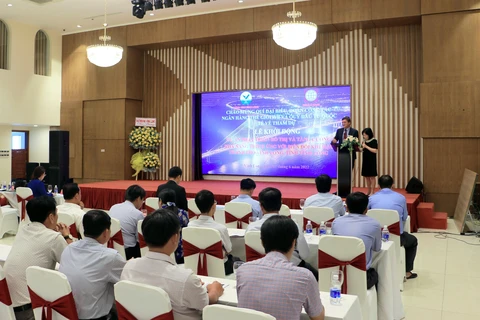 Carolyn Turk, Country Director for the World Bank in Vietnam. (Photo from Vietnam Government Portal)
Carolyn Turk, Country Director for the World Bank in Vietnam. (Photo from Vietnam Government Portal) Carolyn Turk, Country Director for the World Bank in Vietnam, made the statement at a conference to announce the Mekong Delta Regional Master Plan and Investment Promotion for the Period 2021-30 opened on June 21 in Can Tho city.
Congratulating the Vietnamese Government on this first-ever regional master plan, she noted that it demonstrated the whole-of-government approach and a strong commitment to promoting sustainable development and enhancing the climate resilience of the Mekong Delta.
The planning highlighted the new mindset and new vision for the region considered a global hotspot for climate change, the WB official said, adding that many estimates suggest increasing climate impacts may, in a year, cost the region up to 70 million USD in the rainy season due to flooding and up to 1.7 billion USD in the dry season due to drought and salinisation.
She said that from a vision and planning into implementation was always a challenge, and there were already some observable trends that would need to be addressed to spearhead the transformation of the Delta’s economy.
“For example, while the Mekong Delta region has made a stellar contribution to the economy of Vietnam in the past, it is now the only region in the country where the share of districts with poverty rates above the national average increased from 2015 to 2019. This has been further compounded as we know by the dual crisis of droughts in 2020 and the COVID-19 pandemic.”
The region had also witnessed out-migration over the last years due to climate change, especially with migrants from the region accounting for about 37 per cent of all migrants in the country in 2020, she added.
Carolyn said the long-term COVID-19 pandemic impacts, global economic turbulence, and market uncertainty all made it an exceptional challenge for the region to achieve its ambitious goals and targets set in the master plan and contribute to Vietnam’s goal of reaching high-income status by 2045.
She urged the Government to be focusing on efficiency and effectiveness, with a strategic and implementable Action Programme to accompany the Regional Master Plan, given the estimated financing needs of at least 57 billion USD between now and 2030 for the plan’s investment.
“I am also pleased to see a strong emphasis on private sector engagement and I strongly encourage you to put in place the necessary enabling regulatory framework and institutional mechanisms for scaling up private finance,” the WB official noted.
There is also a need for clear guidance and “consensus of roles and responsibilities of all key stakeholders, and a strong engagement and collaboration across relevant sectors and across levels of administration.”
The master should also be a “living document” that is adaptive and flexible during its implementation, with proper feedback mechanism to allow for continuous reflection, assessment, updating, and revision, Carolyn said, adding that a robust monitoring and evaluation framework is also needed to record and assess the progress being made and ensure quality of implementation.
The WB said it would continue to support Vietnam as the master plan comes into implementation after having contributed to the formulation of the Mekong Delta Regional Plan, especially in providing underpinnings for the development of the master plan, policy development and strengthening regional coordination.
“We are committed to bringing our global knowledge, convening power and financing to work in partnership with the whole-of-government, development partners, private sector, and other key stakeholders to achieve sustainable, climate resilient and inclusive growth for the Mekong Delta,” she said.
The institution had already commenced the preparation of an integrated programme to operationalise the Regional Master Plan – enhancing the resilience of Mekong Delta’s people, livelihoods and assets, and improving regional productivity and competitiveness in the face of increasing climate and development challenges compounded by COVID-19 impacts, the WB director said./.
VNA






















